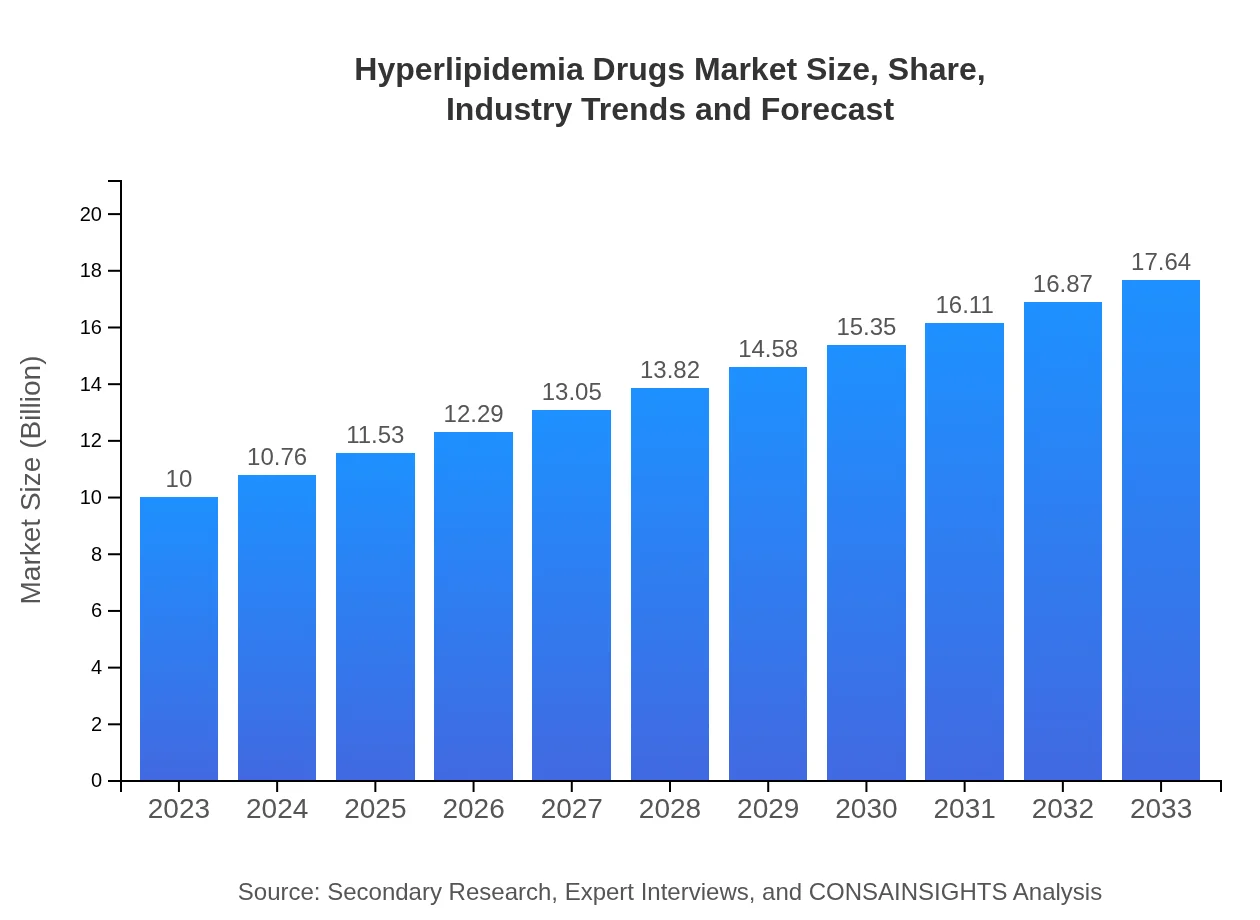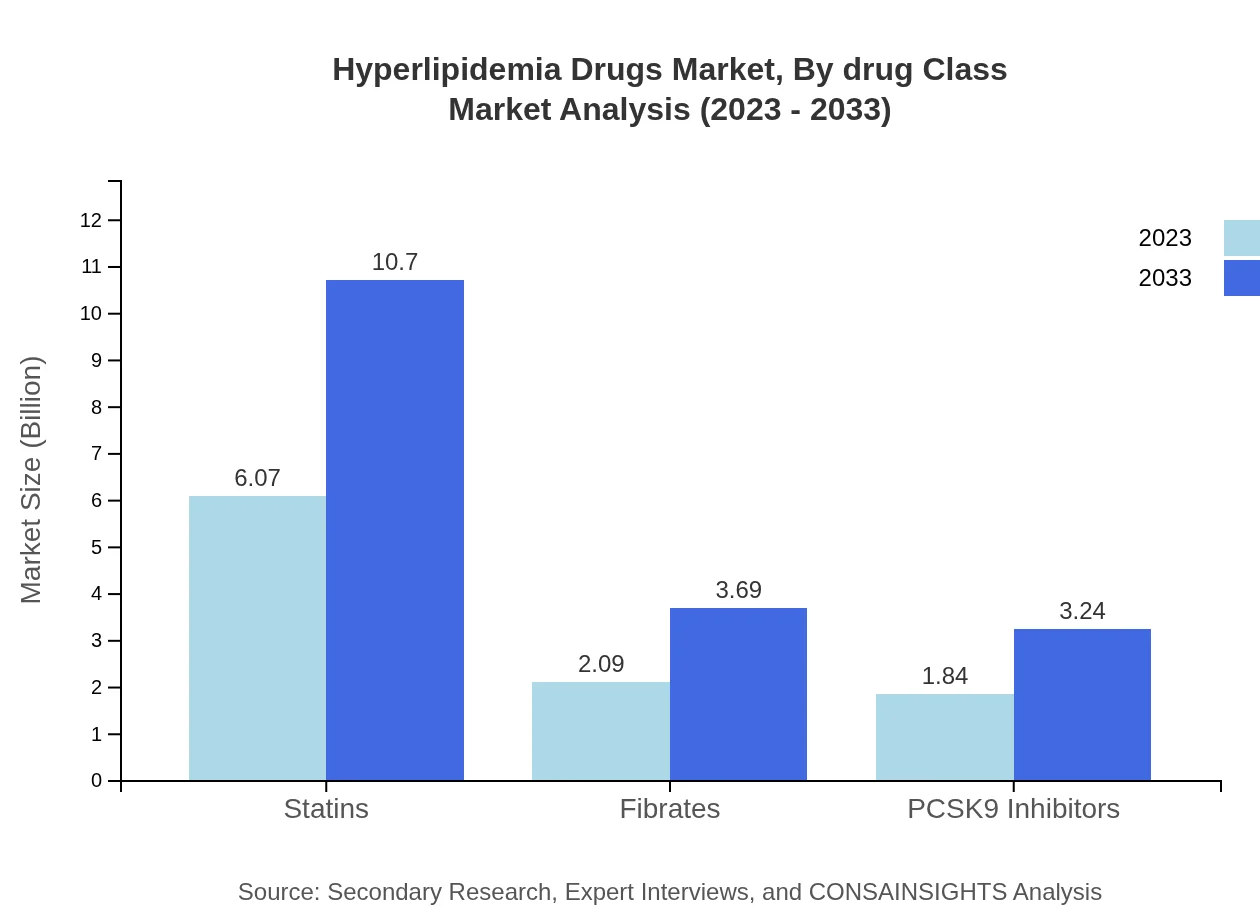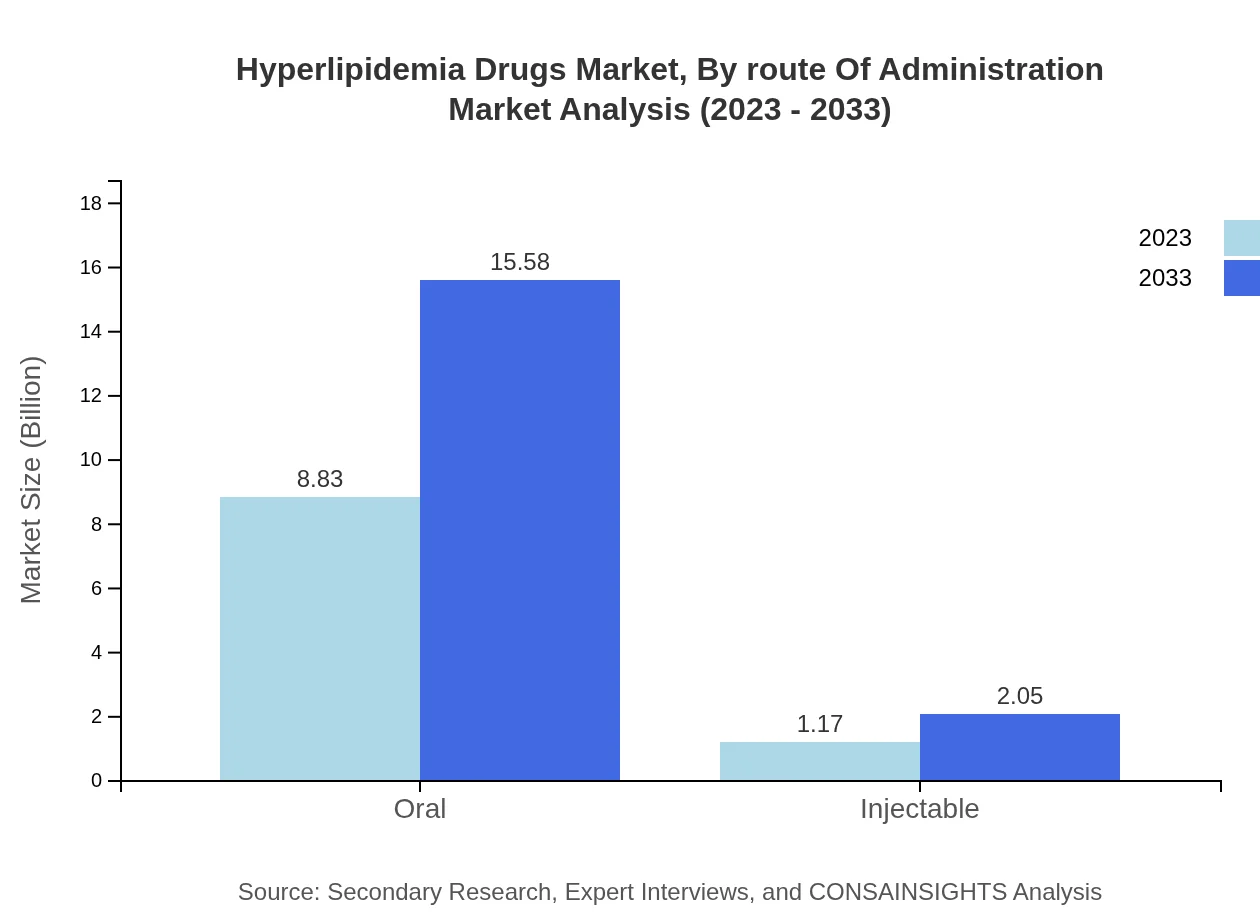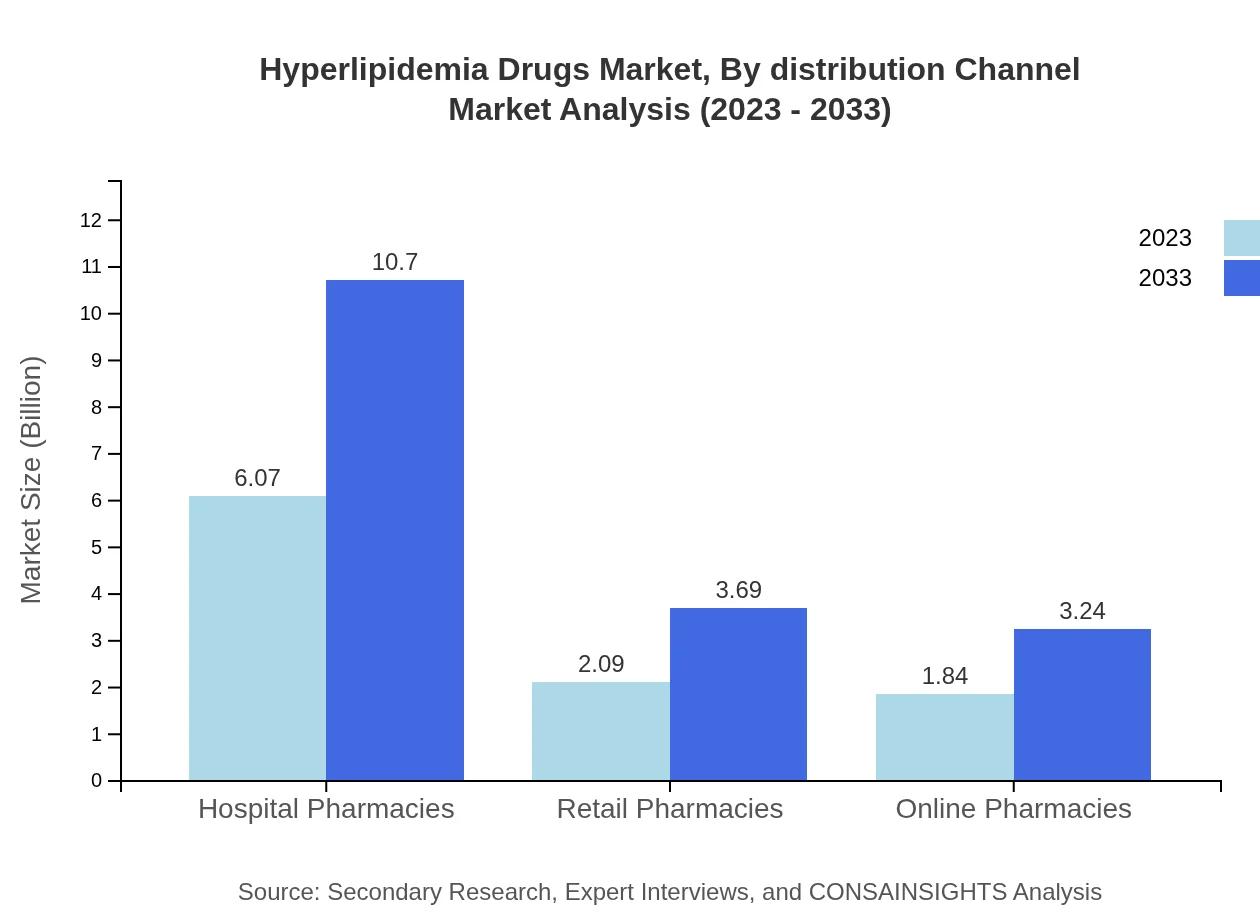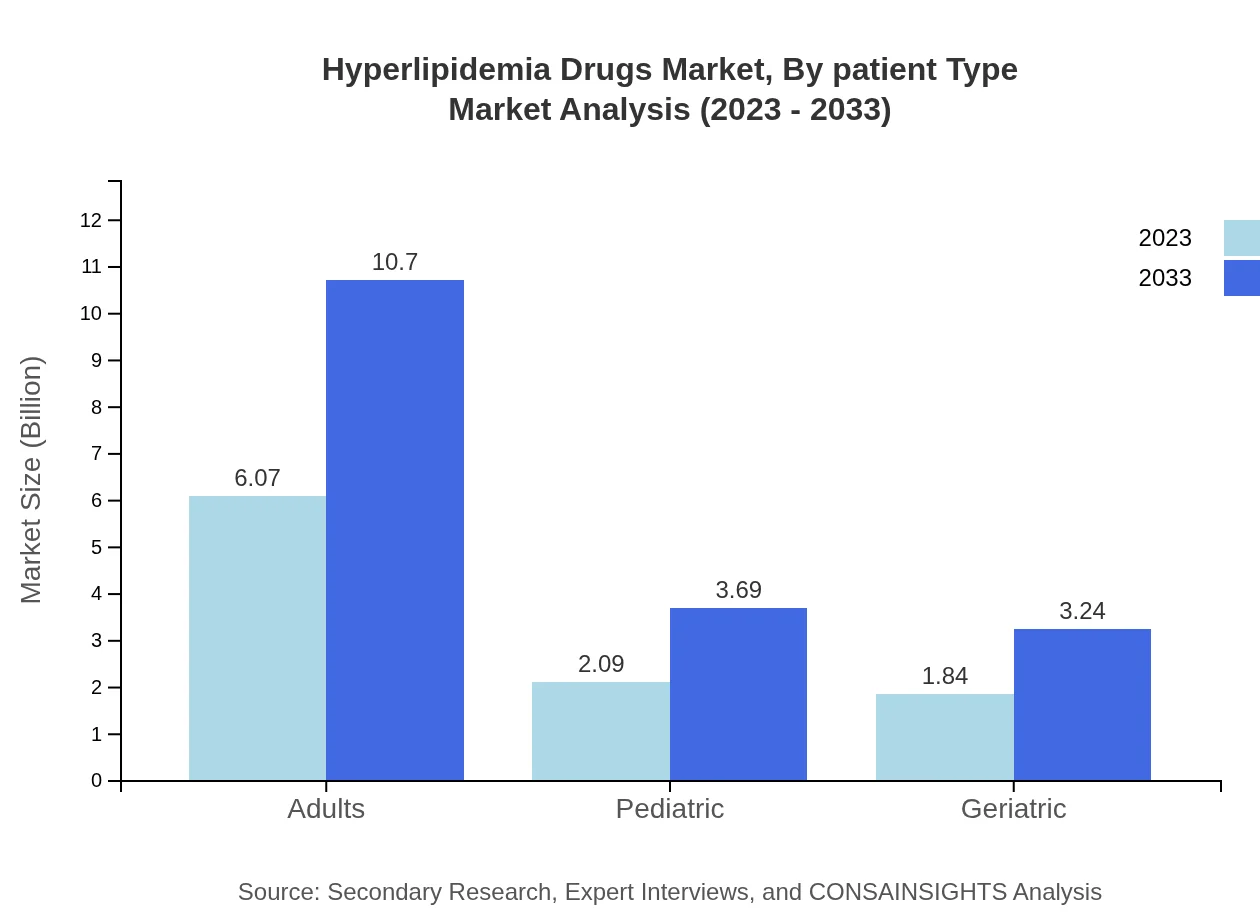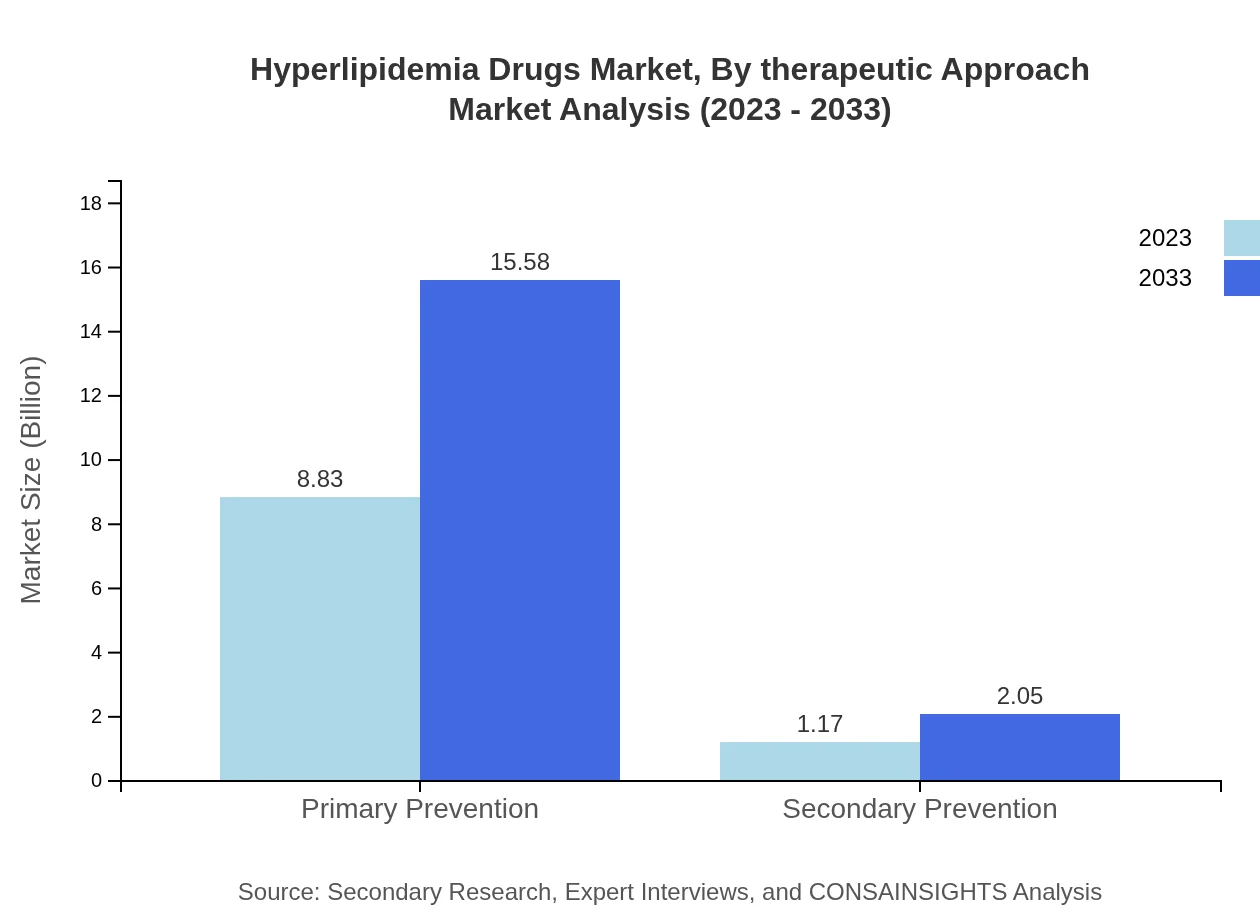Hyperlipidemia Drugs Market Report
Published Date: 31 January 2026 | Report Code: hyperlipidemia-drugs
Hyperlipidemia Drugs Market Size, Share, Industry Trends and Forecast to 2033
This report provides an in-depth analysis of the Hyperlipidemia Drugs market, covering market dynamics, size projections, regional assessments, and key players. Insights are drawn from 2023 to 2033, focusing on trends, technology, and evolving patient demographics.
| Metric | Value |
|---|---|
| Study Period | 2023 - 2033 |
| 2023 Market Size | $10.00 Billion |
| CAGR (2023-2033) | 5.7% |
| 2033 Market Size | $17.64 Billion |
| Top Companies | Pfizer Inc., Novartis AG, Amgen Inc., Sanofi S.A. |
| Last Modified Date | 31 January 2026 |
Hyperlipidemia Drugs Market Overview
Customize Hyperlipidemia Drugs Market Report market research report
- ✔ Get in-depth analysis of Hyperlipidemia Drugs market size, growth, and forecasts.
- ✔ Understand Hyperlipidemia Drugs's regional dynamics and industry-specific trends.
- ✔ Identify potential applications, end-user demand, and growth segments in Hyperlipidemia Drugs
What is the Market Size & CAGR of Hyperlipidemia Drugs market in 2023?
Hyperlipidemia Drugs Industry Analysis
Hyperlipidemia Drugs Market Segmentation and Scope
Tell us your focus area and get a customized research report.
Hyperlipidemia Drugs Market Analysis Report by Region
Europe Hyperlipidemia Drugs Market Report:
Europe’s market for Hyperlipidemia Drugs is anchored at $2.70 billion in 2023 with a projected market size of $4.76 billion by 2033. The region benefits from extensive healthcare coverage and a proactive approach to preventive healthcare, along with significant investments in pharmaceutical research.Asia Pacific Hyperlipidemia Drugs Market Report:
In 2023, the market in Asia Pacific was valued at $2.06 billion and is expected to grow to $3.64 billion by 2033, driven by increasing awareness of hyperlipidemia and improving healthcare infrastructure. The region is witnessing innovative drug launches and rising adoption among the middle-aged population.North America Hyperlipidemia Drugs Market Report:
With a market value of $3.63 billion in 2023, the North American region is projected to surpass $6.40 billion by 2033. This region’s growth is attributed to advanced healthcare systems, a high incidence of hyperlipidemia cases, and ongoing research leading to innovative drug therapies.South America Hyperlipidemia Drugs Market Report:
The South American market stood at $0.61 billion in 2023, forecasted to reach $1.08 billion by 2033. Growing middle-class populations coupled with greater healthcare access are key growth factors, along with governmental health initiatives to combat non-communicable diseases.Middle East & Africa Hyperlipidemia Drugs Market Report:
The Middle East and Africa's market stood at $1.00 billion in 2023 and is expected to grow to $1.76 billion by 2033. The rise can be linked to increasing health awareness, growing incidence of chronic diseases, and improving healthcare initiatives within urban areas.Tell us your focus area and get a customized research report.
Hyperlipidemia Drugs Market Analysis By Drug Class
Statins continue to dominate the market, valued at $6.07 billion in 2023, with a projected growth to $10.70 billion by 2033. Fibrates and PCSK9 Inhibitors follow, showing significant growth potential in a sector increasingly focused on personalized medicine. Statins represent a robust market share at 60.69%, indicating their continued importance in lipid management.
Hyperlipidemia Drugs Market Analysis By Route Of Administration
The oral route remains prevalent, accounting for $8.83 billion in 2023, with an anticipated escalation to $15.58 billion by 2033. Injectable drugs are gaining traction with projected growth from $1.17 billion to $2.05 billion. This shift represents growing comfort with injectable therapies among patients and providers.
Hyperlipidemia Drugs Market Analysis By Distribution Channel
Hospital pharmacies lead the distribution channel segment with a market size of $6.07 billion in 2023, projected to grow to $10.70 billion by 2033. Online pharmacies are rapidly emerging, indicating changing consumer behavior towards digital health solutions and convenience.
Hyperlipidemia Drugs Market Analysis By Patient Type
The adult segment dominates, currently valued at $6.07 billion in 2023, expected to grow to $10.70 billion by 2033. Pediatric and geriatric segments, while smaller, are also showing impressive growth rates as awareness increases regarding cholesterol management across all age groups.
Hyperlipidemia Drugs Market Analysis By Therapeutic Approach
Primary prevention remains the most significant therapeutic approach, expected to grow from $8.83 billion in 2023 to $15.58 billion by 2033, signifying healthcare’s shift towards preventive measures in combating hyperlipidemia. Secondary prevention strategies are also projected to rise steadily, ensuring comprehensive care for all patients.
Hyperlipidemia Drugs Market Trends and Future Forecast
Tell us your focus area and get a customized research report.
Global Market Leaders and Top Companies in Hyperlipidemia Drugs Industry
Pfizer Inc.:
Pfizer is a global leader in the development and marketing of innovative therapeutics, including Lipitor, a leading statin used in the treatment of high cholesterol.Novartis AG:
Novartis focuses on innovative medicines across various diseases, including cardiovascular medications that play a crucial role in managing hyperlipidemia.Amgen Inc.:
Amgen is recognized for its advancements in biotechnology and is a leading producer of PCSK9 inhibitors, pivotal in hyperlipidemia treatment.Sanofi S.A.:
Sanofi engages in research and development of effective therapies aimed at lipid regulation and has a robust pipeline of new formulations.We're grateful to work with incredible clients.









FAQs
What is the market size of hyperlipidemia Drugs?
The global hyperlipidemia drugs market is projected to reach approximately $10 billion by 2033, growing at a CAGR of 5.7% from 2023. This growth reflects increasing awareness and treatment of cholesterol-related conditions.
What are the key market players or companies in the hyperlipidemia Drugs industry?
Key players in the hyperlipidemia drugs industry include major pharmaceutical companies known for cardiovascular medications, actively investing in R&D to innovate and expand their portfolios within this therapeutic area.
What are the primary factors driving the growth in the hyperlipidemia Drugs industry?
Major factors driving market growth include rising rates of metabolic disorders, increasing prevalence of cardiovascular diseases, and growing awareness of the importance of cholesterol management among healthcare professionals and patients.
Which region is the fastest Growing in the hyperlipidemia Drugs market?
The Asia Pacific region is anticipated to exhibit significant growth in the hyperlipidemia drugs market, with market values projected to rise from $2.06 billion in 2023 to $3.64 billion by 2033.
Does ConsaInsights provide customized market report data for the hyperlipidemia Drugs industry?
Yes, ConsaInsights offers tailored market report data for the hyperlipidemia drugs industry to meet specific client needs, incorporating detailed analysis and insights for strategic decision-making.
What deliverables can I expect from this hyperlipidemia Drugs market research project?
Deliverables typically include comprehensive reports, market forecasts, competitive landscape analysis, regional insights, and strategic recommendations to aid in informed business planning.
What are the market trends of hyperlipidemia Drugs?
Current market trends for hyperlipidemia drugs encompass advancements in drug formulations, increased focus on personalized medicine, and a shift towards more effective and safer treatment options for patients.

